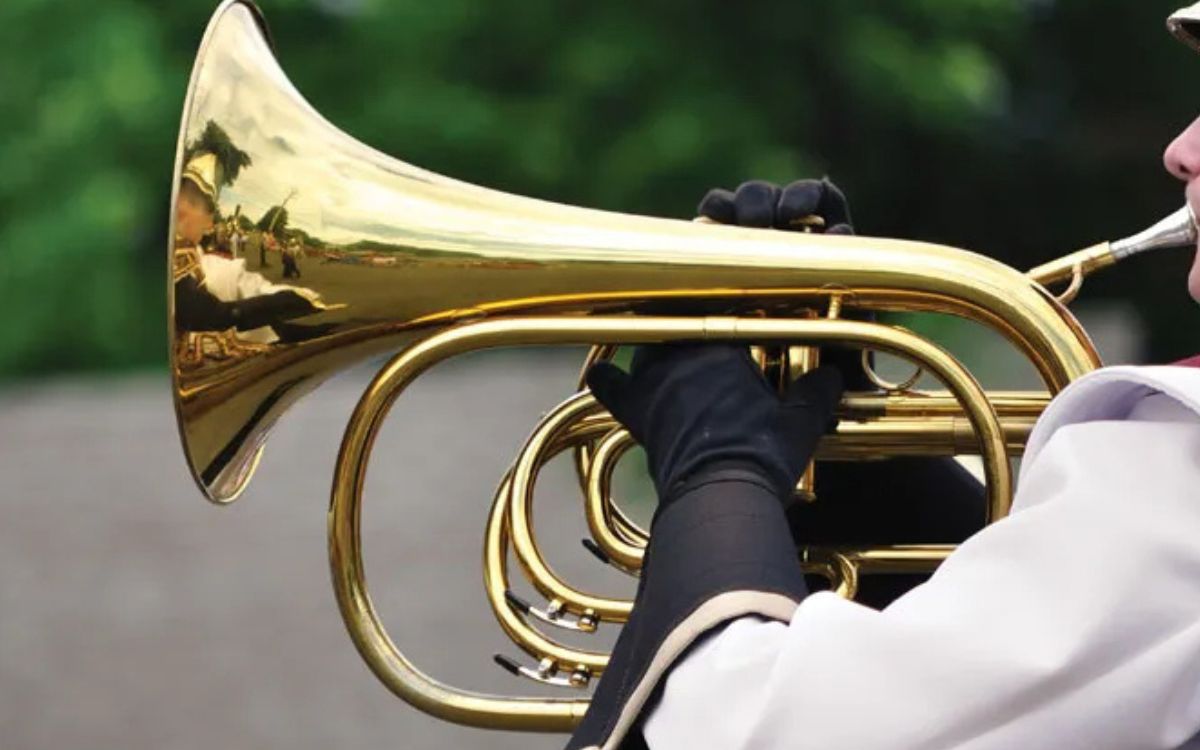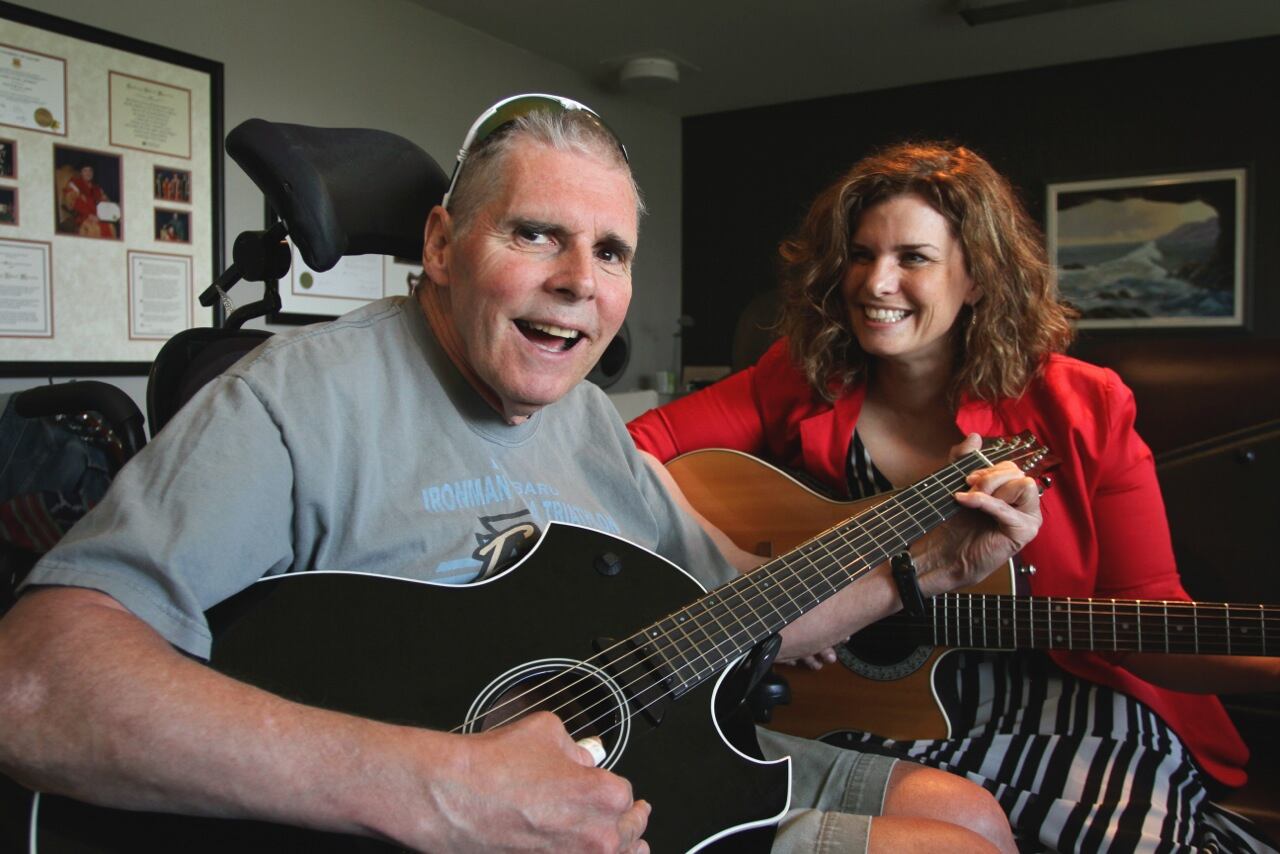Home>Events & Info>Music Therapy>How Does Music Therapy Affect The Breath And Heart Rate


Music Therapy
How Does Music Therapy Affect The Breath And Heart Rate
Published: February 2, 2024
Discover the incredible effects of music therapy on breath and heart rate. Explore how music therapy positively impacts your well-being and promotes relaxation.
(Many of the links in this article redirect to a specific reviewed product. Your purchase of these products through affiliate links helps to generate commission for AudioLover.com, at no extra cost. Learn more)
Table of Contents
Introduction
Music has been a powerful form of expression and healing throughout human history. Whether it’s a catchy pop tune that lifts our spirits or a soothing melody that helps us relax, music has the ability to evoke emotions and create a sense of connection. Music therapy harnesses the therapeutic power of music to improve physical, emotional, and mental well-being.
Music therapy is a specialized discipline that involves the use of music and musical interventions to achieve therapeutic goals. It is a holistic approach that recognizes the interconnectedness of the mind, body, and spirit. This therapeutic practice has been used for centuries, with evidence of its healing effects dating back to ancient civilizations.
Through music therapy, individuals can experience improvements in various aspects of their lives, including physical health. The rhythm, tempo, and melody of music can have a profound impact on the body, particularly on the breath and heart rate.
In this article, we will explore the effects of music therapy on breathing and heart rate, and the many benefits it can offer for individuals of all ages and backgrounds. Whether you’re a music lover or someone interested in exploring alternative forms of therapy, join us on this journey to discover the profound connection between music, breathing, and heart rate.
What is Music Therapy
Music therapy is a specialized discipline that utilizes the power of music to address physical, emotional, cognitive, and social needs. It is a client-centered approach that involves both the active and receptive aspects of engaging with music to achieve therapeutic goals. Music therapists are trained professionals who use their knowledge of music and its therapeutic effects to improve the well-being of individuals of all ages and with various health conditions.
Music therapy sessions can take many forms, depending on the needs and preferences of the individual. They may involve activities such as listening to music, singing, playing instruments, songwriting, and movement to music. The music therapist works closely with the client to tailor the interventions to their specific goals and abilities.
Music therapy is based on the understanding that music has a unique impact on the brain and body. It can influence emotions, reduce stress, promote relaxation, enhance communication skills, improve motor coordination, and stimulate cognitive functions. The therapeutic relationship between the music therapist and the client is crucial in creating a safe and supportive environment for the exploration and expression of emotions through music.
Music therapy is used in a variety of settings, including hospitals, rehabilitation centers, schools, nursing homes, and mental health facilities. It can benefit individuals with a wide range of conditions, including autism spectrum disorder, developmental disabilities, Alzheimer’s disease, chronic pain, depression, anxiety, and trauma. Music therapy can be provided as an individual or group intervention, depending on the needs and goals of the client.
It’s important to note that music therapy is different from simply listening to music for relaxation or enjoyment. While music can certainly have a positive effect on mood and well-being, music therapy involves the intentional use of music by a trained professional to achieve specific therapeutic outcomes.
Overall, music therapy is a versatile and evidence-based approach to enhance physical, emotional, and psychological well-being. Let us now delve into the connection between music therapy and physical health, starting with its impact on breathing.
The Connection between Music and Physical Health
Music has a profound impact on our physical health. Studies have shown that listening to music can result in numerous physiological changes in the body, including alterations in breathing, heart rate, blood pressure, and muscle tension.
When we engage with music, whether through listening, singing, or playing an instrument, our bodies instinctively respond. This response is known as entrainment, where our physiological processes synchronize with the rhythm and tempo of the music. For example, when we listen to lively and upbeat music, our heart rate and breathing tend to increase, mirroring the energetic tempo of the music. Conversely, when we listen to slow, soothing music, our heart rate and breathing tend to slow down, promoting a state of relaxation and calmness.
One of the key ways in which music influences our physical health is through its impact on the breath. Breathing is a vital physiological process that directly affects our overall well-being. Music has the power to regulate and modulate our breathing patterns, leading to various benefits.
When we listen to music with a slow and steady tempo, our breathing tends to naturally synchronize with the rhythm. This can have a calming effect on the body, reducing stress and promoting deep relaxation. Slow-paced music is often used in music therapy sessions to induce a state of tranquil breathing, helping individuals to regulate their emotions and find inner peace.
On the other hand, music with a fast tempo can have an energizing effect on our breath. Upbeat and lively music can stimulate increased respiratory rate and deeper inhalations, resulting in a surge of energy and heightened physical activity. This is why fast-paced music is often used during workouts or exercise routines to boost motivation and endurance.
In addition to its impact on breathing, music also has a direct influence on heart rate. Just as our breathing rhythm can synchronize with the tempo of music, our heart rate can also respond to the musical beat.
Research has shown that when we listen to music with a slower tempo, our heart rate tends to decrease, leading to a state of relaxation. This can be particularly beneficial for individuals experiencing stress, anxiety, or high blood pressure. The soothing melodies and gentle rhythms of certain types of music, such as classical or ambient music, can help lower heart rate and induce a sense of calmness and tranquility.
Conversely, listening to music with a faster tempo can stimulate an increase in heart rate, resulting in a boost in energy and arousal. This can be beneficial during physical activities that require increased cardiovascular effort, such as running or dancing.
Overall, the connection between music and physical health is undeniable. Music has the power to influence our breathing and heart rate, leading to various physiological changes in the body. In the next sections, we will explore in more detail the effects of music therapy on breathing and heart rate, and the many benefits it can offer for individuals seeking to improve their overall well-being.
The Effects of Music Therapy on Breathing
Music therapy has been shown to have a profound impact on breathing patterns, leading to various therapeutic effects. Through the intentional use of music, music therapists can help individuals regulate their breathing and improve their overall respiratory health.
One of the primary ways in which music therapy affects breathing is through the process of entrainment. As mentioned earlier, entrainment is the synchronization of physiological processes with the rhythm and tempo of music. When individuals engage with music therapy, their breathing patterns naturally align with the musical rhythm, resulting in a more regulated and balanced breath.
Music therapists may incorporate specific breathing exercises into their sessions to further enhance the therapeutic benefits. These exercises involve matching the inhalation and exhalation with the tempo of the music, encouraging deep and diaphragmatic breathing. This type of breathing is known to promote relaxation, reduce tension, and increase oxygen intake.
Music therapy can also be effective in promoting mindfulness and body awareness, which are closely intertwined with breathing. By focusing on the music and paying attention to the sensations of the breath, individuals can become more attuned to their bodies and develop a greater sense of relaxation and presence in the moment.
For individuals with respiratory conditions such as asthma or chronic obstructive pulmonary disease (COPD), music therapy can be particularly beneficial. Research has shown that the use of specific musical techniques, such as slow and controlled exhalations during singing or playing wind instruments, can improve lung function and enhance respiratory muscle control.
Furthermore, music therapy can help alleviate symptoms of anxiety and stress, which often manifest through shallow and rapid breathing. By listening to calming music, individuals can experience a reduction in anxiety levels, leading to a corresponding decrease in breathing rate and an increase in the depth of each breath. This promotes a more balanced and relaxed state of being.
Music therapy is also effective in reducing pain and discomfort, which can have a direct impact on breathing patterns. By providing a distraction from pain and creating a soothing environment, music therapy helps individuals shift their focus away from their physical discomfort, allowing them to breathe more freely and deeply.
In summary, music therapy has a profound impact on breathing patterns, allowing individuals to regulate their breath and experience various therapeutic benefits. By incorporating breathing exercises, promoting mindfulness, and addressing specific respiratory conditions, music therapists help individuals enhance their respiratory health and well-being.
The Effects of Music Therapy on Heart Rate
Music therapy has a direct influence on heart rate, impacting both the resting heart rate and the variability of heart rate. By utilizing the power of music, music therapists can help individuals achieve a more balanced and regulated heart rate, leading to improved cardiovascular health and overall well-being.
One of the primary ways in which music therapy affects heart rate is through its ability to induce relaxation and reduce stress. When individuals listen to calming and soothing music, their bodies enter a state of relaxation, resulting in a decrease in heart rate. This is particularly beneficial for individuals who experience elevated heart rates due to anxiety, high blood pressure, or other stress-related conditions. By promoting a relaxed state, music therapy helps individuals achieve a more normal and healthy heart rate.
Additionally, music therapy can help individuals manage their heart rate variability, which is the variation in the time interval between consecutive heartbeats. A higher heart rate variability is associated with better cardiovascular health and increased resilience to stress. Music therapy interventions that involve guided breathing exercises, synchronized with the rhythm of the music, can help regulate heart rate variability and promote a more balanced autonomic nervous system response.
Furthermore, music therapy can have an energizing effect on heart rate. Upbeat and lively music can stimulate an increase in heart rate, promoting a sense of arousal and heightened physical activity. This can be beneficial during exercise sessions, as music can enhance motivation, endurance, and overall performance. Music therapy interventions that involve rhythmic movement to music or using music as a tempo guide during workouts can help individuals maintain an optimal heart rate during exercise.
Music therapy is also effective in improving cardiovascular health by reducing blood pressure. Studies have shown that listening to relaxing music can lead to a decrease in both systolic and diastolic blood pressure. By reducing blood pressure, music therapy contributes to a healthier heart rate and overall cardiovascular function.
Furthermore, music therapy can aid in the management of chronic pain, which often affects heart rate. Chronic pain can lead to an increase in heart rate and heightened sympathetic nervous system activity. By distracting individuals from their pain and promoting relaxation, music therapy helps reduce pain-related stress, leading to a decrease in heart rate and a more balanced autonomic response.
In summary, music therapy has a significant impact on heart rate, influencing both the resting heart rate and heart rate variability. By inducing relaxation, promoting optimal heart rate during exercise, reducing blood pressure, and improving pain management, music therapy contributes to improved cardiovascular health and overall well-being.
Benefits of Music Therapy for Breathing and Heart Rate
Music therapy offers numerous benefits for breathing and heart rate, impacting both physical and emotional well-being. By harnessing the power of music, music therapists help individuals achieve a more balanced and regulated breath and heart rate, leading to improved respiratory and cardiovascular health.
One of the key benefits of music therapy for breathing and heart rate is stress reduction. Stress has a direct impact on our breathing and heart rate, often leading to shallow breathing, increased respiration rate, and elevated heart rate. Music therapy, with its calming and soothing melodies, can help individuals relax and lower their stress levels, leading to a more balanced and effortless breath and heart rate.
Moreover, music therapy promotes relaxation and can induce a state of deep relaxation, allowing individuals to experience a slower breath and heart rate. This relaxation response not only helps reduce stress but also aids in improving sleep quality and overall sleep patterns. Restful sleep contributes to a healthier breath and heart rate during both wakeful hours and sleep.
In addition, music therapy can enhance self-awareness and body-mind connection. By engaging with music and focusing on the breath and heart rate, individuals become more attuned to their bodies. This increased awareness allows them to identify and regulate any fluctuations in their breath and heart rate, promoting a sense of control and self-regulation over their physical well-being.
Furthermore, music therapy can be particularly beneficial for individuals with respiratory conditions such as asthma or COPD. By incorporating specific breathing exercises and techniques into the sessions, individuals can improve their lung function, strengthen respiratory muscles, and experience better breath control. This leads to a more efficient breath and improved overall respiratory health.
For individuals with cardiovascular conditions or high blood pressure, music therapy offers a natural and non-invasive way to regulate heart rate and blood pressure. Listening to relaxing music has been shown to reduce both resting heart rate and blood pressure, contributing to better cardiovascular health. Incorporating music therapy into a comprehensive treatment plan can help individuals manage their cardiovascular conditions more effectively.
Additionally, music therapy can enhance the overall exercise experience. By using music as a motivational tool during physical activities, individuals can maintain an optimal heart rate, improve endurance, and increase the enjoyment of exercise. This can lead to more consistent physical activity, resulting in long-term benefits for both breathing and heart rate.
Overall, music therapy offers a wide range of benefits for breathing and heart rate. From stress reduction and relaxation to improved self-awareness and management of respiratory and cardiovascular conditions, music therapy provides a holistic and effective approach to promote optimal respiratory and cardiac health.
Applications of Music Therapy in Healthcare Settings
Music therapy has a wide range of applications in healthcare settings, offering valuable support and therapeutic interventions for individuals of all ages and health conditions. By incorporating music into healthcare practices, music therapists can enhance the overall well-being of patients and contribute to their physical, emotional, and psychological healing.
One of the key applications of music therapy in healthcare is in pain management. Music has been shown to alleviate pain by reducing anxiety, promoting relaxation, and distracting individuals from their discomfort. Music therapy interventions, such as listening to calming music or engaging in musical activities, can help individuals cope with pain, decrease the need for pain medications, and improve overall pain management.
Furthermore, music therapy is widely used in mental health settings. Music has a profound impact on emotions and can be a powerful tool for emotional expression and regulation. Music therapy sessions provide individuals with a safe space to explore and express their emotions through music, fostering healing and personal growth. Music therapy has been effective in treating conditions such as depression, anxiety, post-traumatic stress disorder (PTSD), and substance abuse.
In pediatric settings, music therapy is utilized to support children’s well-being during medical procedures, alleviate anxiety, and help with pain management. Music therapists work closely with children to create a safe and engaging environment where they can use music as a means of self-expression, comfort, and empowerment. Music therapy interventions can involve singing, instrument play, music listening, and songwriting, tailored to meet the specific needs and developmental levels of each child.
Music therapy is also beneficial for older adults, particularly those with dementia or Alzheimer’s disease. Music has the ability to evoke memories and emotions, even in individuals with advanced cognitive decline. Music therapy interventions can help stimulate cognitive function, improve mood, reduce agitation, and enhance social interaction in older adults. Group singing or listening to familiar songs can bring comfort and connection to those who may be experiencing the challenges of memory loss.
Additionally, music therapy is utilized in rehabilitation settings, such as physical therapy and occupational therapy. Music can be incorporated into movement exercises and activities to improve motor skills, coordination, balance, and range of motion. The rhythmic elements of music can serve as a guiding framework for physical rehabilitation, making therapy more engaging and enjoyable for patients.
Music therapy is also beneficial in palliative and end-of-life care. Music can provide comfort, emotional support, and a sense of peace to individuals facing terminal illnesses. Music therapy can be tailored to meet the unique needs and preferences of each individual, providing solace and helping them connect with their emotions, loved ones, and spirituality during their final journey.
Overall, the applications of music therapy in healthcare settings are vast and diverse. From pain management and mental health support to pediatric care, older adults, and rehabilitation, music therapy plays a vital role in promoting holistic well-being and enhancing the quality of care provided in healthcare settings.
Conclusion
Music therapy is a powerful and effective form of therapy that harnesses the therapeutic aspects of music to promote physical, emotional, and psychological well-being. Through the intentional use of music, music therapists help individuals regulate their breathing and heart rate, leading to a range of therapeutic benefits.
Music therapy has been shown to have a profound impact on breathing patterns, promoting relaxation, and deepening breaths. By incorporating specific breathing exercises and techniques, music therapy helps individuals achieve a more balanced and regulated breath, improving respiratory health and reducing stress and anxiety.
In addition, music therapy has a direct influence on heart rate, with calming music inducing a decrease in heart rate and promoting relaxation. It can also energize heart rate during physical activities, enhancing motivation and endurance. By reducing blood pressure, improving heart rate variability, and managing chronic pain, music therapy contributes to better cardiovascular health and overall well-being.
The benefits of music therapy for breathing and heart rate extend to various healthcare settings. Whether in pain management, mental health, pediatric care, rehabilitation, or palliative care, music therapy offers valuable support and therapeutic interventions. It provides individuals of all ages and health conditions with a means to express, cope, heal, and connect through the power of music.
As we continue to explore the potential of music therapy, it is crucial to recognize the importance of trained music therapists who can create personalized interventions based on individual needs and goals. The field of music therapy continues to evolve, with ongoing research and evidence supporting its efficacy and expanding applications. This therapeutic modality offers a unique and integrative approach to enhance physical health, emotional well-being, and overall quality of life.
In conclusion, music therapy serves as a bridge between the art of music and the science of healing. By embracing the therapeutic power of music, we can tap into its transformative potential to promote optimal breathing, regulate heart rate, and pave the way for a healthier, harmonious life.











